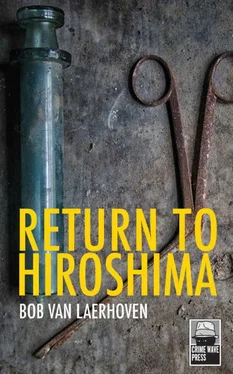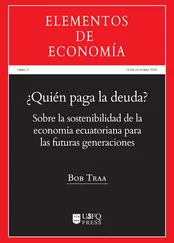I wandered through the ruins in a strange stupor. I’d talk my way out, this wasn’t the first trick I’d played on him – my father seemed to enjoy this cat and mouse game between us, albeit secretly. But the tricks and games weren’t my biggest concern. What worried me most was that he had developed some, if not all, of the characteristics of Rokurobei. The snake-necked demon Rokurobei is also called the King of Lies. His speech had been nothing more than a carefully formulated distortion of reality. Under certain circumstances, Rokurobei has the ability to read the thoughts of anyone within his range of influence, something the Ancients described as “seeing into the soul”. Had my father just reached inside my soul?
I heard a fluttering sound behind me, the sound crows make when they fight over a piece of garbage, or out of boredom.
Someone was standing behind me on the path I had followed without thinking. He was shorter than me, by a head at least, and was standing still. I turned and walked towards him without stopping to think, my hands concealed in my wide sleeves.
I had almost reached him when the man bowed low, in the way expected of underlings. I knew then he wasn’t a Yuzonsha . “ Ohimesama , it is an honour to meet you.” From this distance I noticed to my surprise that he was quite young, probably younger than me. He had an open face, and there was a hint of sensitivity in his eyes, or so I thought.
“Who are you?” I asked abruptly, unable to hide my self-consciousness. He had addressed me as Ohimesama – Princess – without even a trace of sarcasm. Though shorter than me, he was tall for a Japanese man. Long legs, a short trunk, sinewy arms. His eyes drew my attention: the usual Japanese skin fold was less obvious and it made him appear more Korean than Japanese.
“Hidetoshi Inaba, madam.”
“Where are you from?” I sounded like a policewoman. I was tense, on my guard, keeping my hands up my sleeves. But I couldn’t avoid the impression that the boy was sincere, cheerful, I don’t know why.
His “madam” brought home my elevated and cloistered existence. It made me feel uneasy, as if my best years were already behind me.
“Nagasaki.”
“What brings you here?” I knew it was a stupid question. Hashima was officially deserted. Only the boats of my father’s organisation moored here, and always at night.
“I’m a sailor,” he announced with pride.
“On one of my father’s boats?”
He nodded, smiling radiantly, like a child seeing its first butterfly.
It didn’t take me long to find out he was sixteen. He’d run away from his parents six months ago, but remained vague about the reason. Nothing he said about it has stuck in my memory, except for one sentence: “I was living as if in a deep sleep or trance, now I’m awake.”
What a strange boy. But from the first, there was something about him I can only describe as “romantic”, a quality that seemed to be shining down on him from above like a beacon of light. His smile was surprisingly frank and open. He soon appeared at his ease, and there was no sign of that sidelong look of reverential awe I would get from the other seamen on the rare occasions we met. He talked a lot and with great enthusiasm. Before I knew it, we were sitting together in the rubble. Grinning with pride, he produced a flask of spirits from his back pocket and cautiously offered me a drink. The stuff scorched my stomach like sunburn, then a comforting glow took its place. He said he didn’t want to live like his parents, working in the shipyards of Nagasaki. “I love music. When I hear a certain kind of music, something in me changes, I grow, and the world gets smaller.” Later, when I used his name, he said: “I’d prefer if you called me “Crow”, that’s what my shipmates call me. What may I call you?” His smile was so inviting that I allowed him without hesitation to call me Mitsuko. He was hoping to save enough money to go to a conservatory. “I like rap and all that, it’s not that I’m not modern, but the classical composers… Wow. It’s not just their music, though that’s impressive enough. But their lives; they were so—” he cast around for the right word – “exalted”. I was watching him closely, thinking he had also found the right word to describe his own inner life. By “classical”, I assumed he meant Western composers, but didn’t ask, afraid of appearing ignorant. I felt comfortable with him, something that never happened with other people. I found myself wondering if he thought I was ugly, but the way he looked at me didn’t seem to suggest it. I sensed something like admiration in him; or, more accurately perhaps, respect. Strangely enough, our age difference – his sixteen years, my twenty – wasn’t a problem. Doggedly independent from his early youth, he told me he’d always gone his own way, spending hours at the public library. “Libraries calm me down. Quite an achievement, in my case.” His mercurial energy was captivating. In his company I felt normal.
I can’t recall the reason he gave for leaving, but I do remember the way we said goodbye. He bent down and kissed my hand like an eighteenth-century composer would have done. Before I knew it, we’d agreed to meet again two days later, when the boat he was working on would be back.
I’d only walked a dozen steps or so when a shadow fell over me. I knew who it was.
I stopped, head bowed.
The noise the shadow uttered was like the mocking screech of a crow.
Hiroshima – the canal behind the Genbaku Dome – Beate Becht and Xavier Douterloigne – night, March 13 th/14 th1995
Beate Becht always carries a camera, even when she’s out for a stroll at night. She’s marching along the canal behind the Genbaku Dome at a speed even she thinks is slightly Teutonic. Going for a walk in the middle of the night seemed like a good idea at first. A powerful wind is lashing the river. Beate is on her guard. Is that down to her upbringing, her personality, her genes? She’s read that Japan is one of the safest countries on earth for foreigners. From the canal she can see the boulevards, the rivers and the city’s industrial zone. It’s very different from the densely populated city centre she walked through yesterday, full of neon, noise and smells. Near the ruins of the Genbaku Dome, a grim reminder of Hiroshima’s war history, all is quiet. Pools of shadow drift underneath the willows lining the river bank. The benches along the canal, occupied late into the evening by courting young couples not bothered by the dome’s grim perimeter fence, are deserted at this hour. Beate looks to the right. The water of the Aioi River is black. She remembers reading descriptions of the river from shortly after the atom bomb, when it was littered with corpses as brittle as burnt wood. A large firefly, pale as moonlight, skims over the water’s surface. Beate aims her lens and shoots, even though the half-light and the ghostly insect’s abrupt changes of direction have almost certainly rendered the result useless. The firefly makes her think of the genbaku obake , the spirits of the nuclear victims: unmistakably present, difficult to capture.
Further down the riverbank she notices a van, a VW, more hidden than parked between the willows. The colourful painting on its side attracts her attention. She approaches it slowly, her curiosity more powerful than her sense of caution. The manga painting depicts a white-haired girl with the face of a child and large, innocent eyes, dressed in a pleated school skirt and thigh length boots. Her underpants are down around her knees. Her breasts dotted with droplets of sweat dangle from her schoolgirl blouse. She’s being taken from behind by a red-skinned demon with a white, spongy head, lumpy and misshapen like an enormous turnip, and eyes that look both wild and sad. The demon’s massive penis has been painted over with metallic squares, but the girl’s vagina is depicted in great detail, with an exaggerated bulge and fluid dripping in abundance. The van seems abandoned. Reassured, Beate searches for the best angle to take pictures of the scene. The camera flashes twice.
Читать дальше












